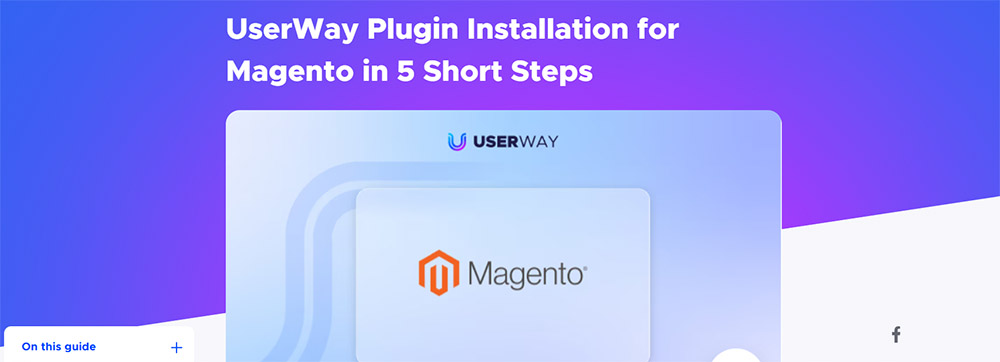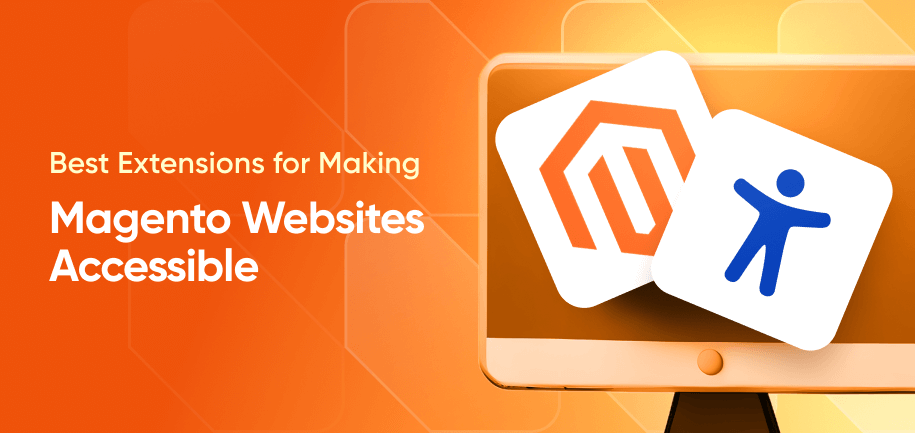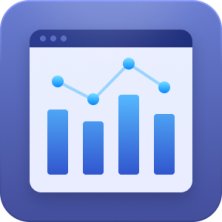For e-commerce ventures running on Magento, accessibility is both a legal requirement and a good business. Your motivation should be more than ADA lawsuits, but social responsibility and commitment to inclusivity. And the right Magento accessibility extension can make a huge difference.
In this guide, we break down the best Magento accessibility plugins and apps that help you reach a wider audience and meet ADA, WCAG 2.1, and EAA 2025 compliance standards without compromising performance or design.
Why Accessibility Matters in Magento Stores
Before diving into the tools, let’s be clear about why you should care. Accessibility features target people with disabilities, including the visually impaired, people with hearing loss, motor difficulties, and cognitive limitations. A fully compliant, accessible website ensures that all users can browse and interact with it.
Failing to meet accessibility standards can result in legal consequences under the Americans with Disabilities Act (ADA), Section 508, and the Web Content Accessibility Guidelines (WCAG). But what’s more, it can alienate or block a significant portion of your customer base from doing business with you.
This is where a solid Magento accessibility plugin comes in. The right tools make it easier to audit, fix, and maintain an accessible online storefront.
Read More: Magento Accessibility Compliance
What to Look For in a Magento Accessibility App
Not all tools are created equal. A reliable Magento accessibility extension should:
- Offer customizable UI elements (contrast toggles, font resizing, etc.)
- Be easy to install and integrate
- Support both frontend and backend enhancements
- Include compliance reporting tools
- Be updated regularly to reflect evolving standards
With that criteria in mind, here are our top picks that help make Magento websites accessible.
1. accessiBe Magento Extension
accessiBe is one of the most widely recognized solutions for automated web accessibility. Their Magento accessibility plugin uses AI to scan, monitor, and adjust your commerce site in real time.

Key Features:
- Automated compliance with ADA and WCAG 2.1
- Screen reader and keyboard navigation support
- Adjustable UI for users (color contrast, font size, etc.)
- Monthly accessibility audits
If you're looking for a plug-and-play Magento accessibility app, accessiBe is hard to beat. It starts working within 48 hours and updates itself automatically.
2. EqualWeb Accessibility Extension for Magento
EqualWeb offers a comprehensive Magento accessibility extension that enhances compliance while improving user experience.

Key Features:
- Over 25 accessibility functions
- Real-time remediation
- Multilingual support
- Ongoing compliance monitoring
EqualWeb’s Magento accessibility plugin is also WCAG 2.1 AA compliant and offers a control panel for users to personalize their experience.
3. UserWay Accessibility Widget for Magento
UserWay’s lightweight widget makes it a popular Magento accessibility app for those who want quick implementation without code.

Key Features:
- One-line installation
- Automated fixes and monitoring
- ADA and WCAG 2.1 compliance
- Voice navigation, contrast settings, and text enlargement
This Magento accessibility plugin is especially great for stores that want a non-intrusive, user-driven solution.
4. AudioEye Magento Extension
AudioEye is a fully managed accessibility solution that offers legal protection and ongoing maintenance.

Key Features:
- Legal monitoring for ADA lawsuits
- Real-time accessibility testing
- Keyboard-only navigation and screen reader optimization
Their Magento accessibility extension focuses not only on compliance but also on risk mitigation.
5. Silktide Accessibility Tool for Magento
Silktide combines website intelligence with accessibility analysis. Though not Magento-specific, its integration capabilities make it a worthy mention.

Key Features:
- Automated WCAG testing
- Accessibility scoring and reporting
- Developer-focused debugging tools
Using Silktide as a Magento accessibility extension allows you to constantly monitor and improve your site without interrupting user flow.
Honorable Mentions
- Monsido: Offers real-time reporting and monitoring but requires a learning curve.
- Siteimprove: Known for deep analytics and integrations, though it's more enterprise-oriented.
- WAVE Evaluation Tool: Not a plugin, but a helpful browser extension for manual accessibility compliance checks.
These tools may not be plug-and-play Magento accessibility plugins, but they can be valuable additions to your workflow.
Tips for Maintaining Long-Term Accessibility in Magento
Even the best Magento accessibility app won’t keep your store compliant forever without some ongoing effort. Here are a few tips:
- Schedule Regular Accessibility and UX Audits: Perform both automated and manual testing to catch issues early.
- Train Your Team: Ensure everyone, from developers to content creators, understands the basics of accessibility.
- Monitor Updates: Stay informed about evolving WCAG standards and update your tools accordingly.
- Use Semantic HTML: Proper headers and alternative text support screen readers and improve site structure.
- Avoid Relying on Overlays Alone: While helpful, overlays can't fix underlying code issues.
Remember that any Magento extension that adds new front-end features must also be ADA/WCAG compliant, ensuring the new content it introduces remains accessible. Amasty offers a robust catalog of Magento accessibility extensions that have been rigorously tested and optimized for compliance with WCAG 2.1 AA level and, hence, the European Accessibility Act (EAA 2025).
Read More: Amasty's Accessibility Trio with Hyvä and Snowdog
Welcome More Customers with an Accessible Magento Store
ADA and WCAG compliance should never be an afterthought. A well-built Magento accessibility extension not only helps safeguard your business from legal risks but also ensures that every visitor can access and navigate your store with ease.
Don’t wait for a complaint to act — take proactive steps now. Choosing a reliable Magento accessibility plugin is both a responsible and strategic move. It’s about doing what’s right and growing your customer base.
Stay committed, stay compliant, and make your store inclusive for all.
Frequently asked questions
An accessibility extension for Magento is a tool that helps make your online store accessible to users with disabilities. These extensions ensure that your website complies with accessibility standards like ADA and WCAG, improving user experience for people with impairments.
Making your Magento store accessible ensures that all users, including those with disabilities, can navigate, interact with, and shop at your site. Beyond providing a better user experience, accessibility compliance reduces legal risks related to ADA violations and boosts your brand’s reputation as an inclusive business.
A Magento accessibility plugin is a module that integrates directly into your store’s backend, offering easy-to-use features for accessibility compliance. A Magento accessibility app usually operates as a standalone tool or widget that can be added to your store for compliance with accessibility guidelines.
There are several top Magento accessibility extensions that are WCAG-compliant, including accessiBe, EqualWeb, and UserWay. These tools help meet the WCAG 2.1 AA guidelines by improving features like keyboard navigation, screen reader support, color contrast, and more.
While accessibility plugins can greatly reduce the risk of ADA lawsuits by ensuring your site is compliant, they do not guarantee full protection. Regular audits, proper implementation, and ongoing updates are crucial to maintaining accessibility and staying compliant with legal standards.
Yes, most Magento accessibility apps are designed for easy installation and integration. They often require minimal coding, allowing merchants to quickly add compliance features to their store with just a few clicks. Some options, like accessiBe, work automatically after installation, making them a great choice for store owners with limited technical knowledge.
To maintain accessibility, you should regularly audit your site with both automated tools and manual testing. Ensure your accessibility extension or plugin is updated as WCAG standards evolve and train your team to prioritize accessibility in content creation and development. It’s also important to monitor for any legal changes related to ADA compliance.

















